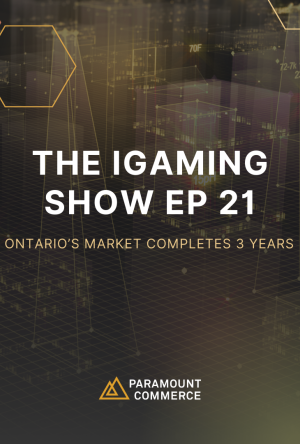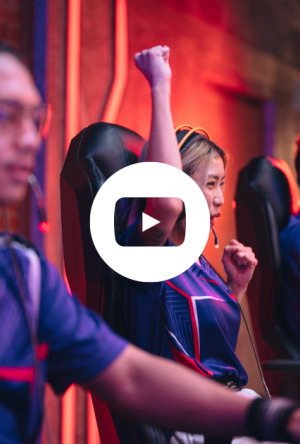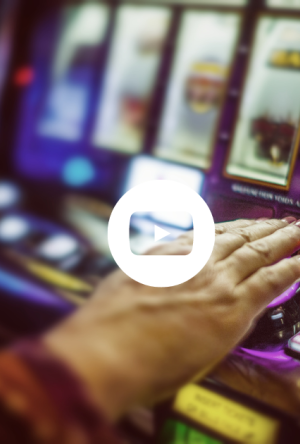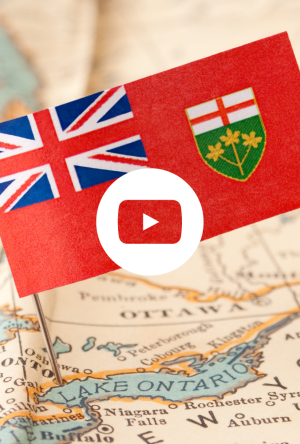
The iGaming Show EP 14 - (Exploring iGaming Regulations With Ron Segev)
In this episode, we’ll explore a fundamental aspect of the iGaming and sports betting industry: regulations. As the online gaming industry continues to grow and evolve in North America, understanding the importance of regulations is more crucial than ever.
The iGaming Show, presented by Paramount Commerce, is a podcast that will analyze gaming industry trends with experts from various gaming organizations.
Please like, comment, and share this video. Also, stay up to date with our content by subscribing to our YouTube channel.
Full episode transcript:
Varad Mehta: Hello everyone and welcome to the 14th episode of The iGaming Show, presented by Paramount Commerce. I’m your host, Varad Mehta, and in this podcast, we analyse gaming industry trends with experts from various gaming organisations. In today’s episode, we’ll take a closer look at one of the most important aspects of iGaming and sports betting: regulations. Our guest today is Ron Segev, the founding partner of Segev LLP. So without further ado, let’s get the show rolling. I wanted to say to you, Ron, Shalom Ron, Ma nish-ma?
Ron Segev: Yeah, Ma nish-ma.
VM: Did I say that properly?
RS: Yeah, not bad. Your Hebrew is excellent.
VM: Okay, perfect. Ron, how we begin this podcast is by asking you a few fun questions, and then we obviously jump right into the topic of discussion. I have three questions lined up for you, quick ones. The first one is, according to your legal expertise, which of the following fictional characters were or are the most believable lawyers? Is it A. Saul Goodman from Better Call Saul? Is it B. Elle Woods from Legally Blonde? Is it C, and my personal favourite,Vincent Gambini from My Cousin Vinny? Or is it D, Lieutenant Daniel Kaffee from A Few Good Men? And Ron, I want the truth.
RS: You can’t handle the truth.
VM: I can’t.
RS: Sorry to say. Okay, well, I have to give you some background on what I think of legal television shows. I cannot watch them because there’s no way you’re wrapping up a five-year trial in 25 minutes. It’s just not happening. Usually, when I do watch them, if my wife is watching one, she’s actually said to me, I can hear you rolling your eyes. That’s how bad I find them. But to answer your question, I think Joe Pesci in My Cousin Vinny, but specifically an excellent representation of a first-year lawyer who has no idea what they’re doing and is just going in and doing their best. You just need a dash of confidence and belief in yourself to achieve an outcome. I think that’s the nice thing about practising law is preparation, preparation, preparation. If you prepare and the law is on your side, you argue the law. If the law is not on your side, you argue the facts. But as long as you’re prepared and, of course, have a certain degree of smarts, then you probably do a good job for your client. And that’s exactly what Joe Pesci proved in My Cousin Vinny. Great opening question, by the way.
VM: I love it that we actually got a legal expert, one of the leaders in gaming and law, to tell me that My Cousin Vinny is a great representation of what a first year lawyer should be. This is really cool. My second fun question for you, Ron, is can you give me a review of this album? I’ll just show it to you. I don’t know if it’ll show on the screen. It is called Switched on Bach. It’s the Trans-Electronic Music Production Inc. presents Switched on Bach. You wrote on your Twitter, “Two Buck Bach, sweet find in almost free bin.” How did you like this album?
RS: Man, your research is insane. Only because…Just some background for my mom, who’s probably watching this, I almost never post anything on social media outside of LinkedIn as you can probably confirm, right?
VM: Yep, I can.
RS: Yeah. Not even Facebook, pretty much nothing. How did I find that record? Disappointing, but you get what you pay for. So two buck Bach. It’s worth two bucks. Let me put it that way. I think the album cover provided me more joy than the actual listening. But thanks for discovering that. I actually still have that record. I should try to give it another shot. Yeah, I’ll give it another shot.
VM: A fun fact. I wrote this down after I looked at that. Wendy Carlos, who played those Bach compositions, also composed the score for A ClockworkOrange, The Shining, and Tron. There is a short BBC segment if you go on YouTube where you can find Wendy talking about this specific album that you got where they played the Moog synthesiser, which was crazy famous in the ‘70s and ‘80s. I believe this was a ‘60s or ’70s recording that you have. Whatever you have in your hand, keep that because that is really cool.
RS: Yeah. I’m a music nerd and I actually owned a mini-moog for a while, a vintage, amazing vintage instruments. If you’re into early L.A. gangster rap, that iconic early Dr. Dre sound, that’s generated with different sine waves on a mini-moog device. That’s just amazing sounding synth from the ’70s.
VM: Look at us. That’s so cool discussing gangster rap. I love this. Now I know we love our fun questions, but we have to move on to the topic of discussion. The important stuff. As you are an expert, as obviously, Segev LLP and the entire team are experts within gaming and gaming regulations and gaming laws. Today, we’re here to discuss why they’re important because I believe having this little chat would be really good and informative for people who might not realise how important regulations are for these high-growth industries suchas gaming or whether you have crypto. But we’ll obviously focus on gaming today. My first question would be that many regions, and even last year we saw in Ontario, introduced regulated gaming markets. Prior, there could be an existence of grey gaming markets. Why do you think this transition is happening and do you think this has taken longer than expected, or do you think this is the perfect time?
RS: Yeah, some good questions there. I think the transition is happening for various reasons. First of all, I think the recent transition has happened because of the good and the hard work that the original jurisdictions have done over the last 15, almost 20 years. Notably, the UK, and Isle of Man, and Malta and other similar jurisdictions who were very early to the gaming scene have proved to the global regulated market that this is a regime that can deal with AML issues, KYC issues. It could deal with underage gambling issues. It could foster a really healthy industry of content studios and data companies and so forth. It can also generate tax revenue and other income for the government authorities. Now, of course, all these jurisdictions have taken missteps, and you’re never going to have a gaming regime that’s ironclad, meaning that you’re going to have some bad apples that are going to be rogue operators under licensed or infringe the terms of a licence. But overall, those regimes did a great job. I think what happened was in the US, first under Governor Chris Christie, New Jersey, realised that by not having a gaming regime, we’re basically allowing an offshore industry to thrive. What is that doing? It’s not really protecting us from underage gaming issues. We don’t have full control over KYC, AML issues. We’re leaving an avenue open to organised crime, and we’re sending all of this money offshore. Not just money, but we’re sending jobs offshore too. I think the real sea change was New Jersey deciding to first legalise what was it? Poker, then sports betting, and then casino, and then other states realising very quickly that, hey, guess what? The sky wasn’t falling. Not just that, but New Jersey made a good go of it. I think that that was the second wave of regulatory progress. The first one being the OGs, the early adopters, and then the second one, I think, really being spurned up by New Jersey. I think we’re in the third wave now with Ontario, I think, being very much the spearhead of the third wave. I think what we’re expecting to come down the pipe is other jurisdictions like Germany finally formalising a regime. Rumours that Finland will do the same soon. Back here in Canada, some talk of Alberta opening up, which is very exciting for our market. It’s not as large a market as Ontario, but in terms of the gaming spend per player, it’s higher than Ontario, so the value of the players are going to be higher. Then we’re seeing some Southeast Asian markets opening up to regulated gaming. Africa continues to open up too, I know that’s an exciting and emerging market for many of our clients. You asked, is it good timing? I think it’s always good timing to regulate the regime. I think a regulated regime is good for everyone. I think it’s good for the player, it’s good for the operator, it’s good for government, and it’s also good for the corporate ecosystem that runs these gaming companies.
VM: Having looked at different markets from the beginning, like you mentioned Europe, like regions like Malta maybe, have you noticed any evolving… How would I phrase it? But have you seen any evolvements within iGaming regulations over the years and how they are now versus how they were maybe 10, 20 years ago, maybe 10 years ago when they hit maybe New Jersey or when they were introduced maybe in Malta or any European regions? Are they different now? Maybe in a region such as Ontario, for example?
RS: Yeah, I think the regulatory regimes, a good regulatory regime will always evolve. I think it’s going to evolve to adapt to the changing market realities. What are those? The first, the regulatory regime has to be competitive for its licensees. What that means is that compliance costs need to be rational. Your access to information from the regulator, I.E., transparency, needs to be really good. You need to be able to have a regulatory team that can do their job efficiently. I think that the cost of the licence has to be rational too. By way of example, when New York State opened up their regime and announced the 50% gaming tax, everyone was pretty shocked by that. I think the latest results are showing that gaming companies who went in the market are actually making a go of it. Whether or not that’s sustainable, I’m not really sure. I think a regulator will keep their eye on all those things. A regulator will also keep theireye on evolving technology. A really good example of that is the adoption of blockchain in gaming. I remember when blockchain tech first emerged, gaming companies wanted to adopt it either as a means of payment processing, taking deposit, or actually having the gameplay on the blockchain. The regulators were averse to it. They didn’t understand it. They were concerned that there would be KYC, AML issues with it. I think they were right to take a cautious approach and get educated on it. But from those early days, their approach has evolved. Now you’ve got many gaming jurisdictions that will actually allow operators to accept Bitcoin, for example, as a deposit means. I think on-chain gaming is less common, but I think we’re going to see it happen more and more commonly. You asked, have we seen changes in these old regimes? Those are few examples. I should mention other examples, protection of the public. Just getting better at protecting the industry against underage gaming. So having controls in advertising so that they don’t appeal to minors is a really good one. Having requirements put on the operators to deal with responsible gambling issues like requiring the possibility for optouts or having a gameplay clock or having the ability to set limits and stuff like that, all of that is industry standard now, but back in the early days, not really. As the industry gets more information about RG issues, responsible gambling issues, the regulator comes alive to it and then adopts these requirements. So we have seen evolution. I think we’re going to continue seeing evolution. And when you ask the question, has Ontario followed suit? Being a relative late comer to the regulated space, I think Ontario has the benefit of a hindsight of all these other regulators. They can adopt best practises day one. I think it’s incumbent on them to not sit on their hands and keep evolving the regulatory landscape to adapt to the industry, which they’re attempting to do most recently with their advertising guidelines. I think that there’s probably been some missteps there with some ambiguity around restrictions around how you can advertise and restrictions against somethings that affiliates can’t do. But these are organic, evolving pieces, right?
VM: No, really well said. I think whenever we think of gaming regulations and me just having been recently part of this or being affiliated with the industry is consumer protectionis the key of regulations. But I would also love to know what are some of the core benefits for maybe regulators themselves, states, provinces? We’ll use provinces since we’re in Canada. Operators themselves, do they pose any benefits for them?
RS: Oh, yeah, totally.Okay. Well, most of my clients will get a licence wherever they can. If the market is compelling and the cost of entry is rational, they will get a licence. As I said, who does it benefit? First, it benefits the government because they will finally have a better control over KYC and AML issues. They will not have a market that is attractive, or I should say they’ll have a market that is less attractive to organised crime because it’s a highly competitive market in an ideal case among lawful registered operators who are competing for that business. It’s not low hanging fruit for organised crime. It’s a source of tax revenue. They can also deal with RG issues. They can protect underage gaming and deal with problem gambling issues and so forth. I think it’s good for the local economy because what it does is it creates a legitimate industry where you can set up a company and service that industry. As I said, you can set up a content studio or you can launch a company or you can relocate company or you can hire people. And guess what? You can finally get a bank account because it’s not a pariah industry. You can advertise openly on indeed.com if you wanted to, not to pitch that site. But you can run a business in the ordinary course, which is a cheaper, more efficient way to do things. You could raise capital, there’s lots of stuff you can do. I think it’s good for local economy. I think it’s good for local population because for all those public interest protection issues that I mentioned, but also opens up more jobs, usually very high value knowledge economy jobs. I think it’s great for the operator too, because the operator actually doesn’t want to operate under the radar. The operator wants to have customer service that deals directly with the customer, wants to be able to advertise openly, wants to be able to differentiate their product and services against the competition in an open manner, wants to freely hire the best people, raise money openly, and apply for tax credits, get bank accounts, all stuff that ordinary industries take for granted. I think with regulation, you come into the light, so to speak, and you can do that.
VM: That’s a good one. Just last two questions. I’d love to know what regulations related to trends you expect to see in the near future. Do you see more technology being adopted to advance regulations and implement them? We spoke about something interesting just a few minutes ago, which is responsible advertising. It’s an evolving thing right now. Are there any specific trends you’re seeing? Do you see markets opening up? What do you see right now that you think is going to be really cool in the future?
RS: Yeah. Well, like everybody, I think AI is going to have a huge impact on our industry. It could be small things or big things. Just some examples. Leveraging AI for a sportsbook, risk and trading desk. A good definition of AI is data plus math. That’s a sophisticated sports book. If you can apply AI to it, it could increase your success rate. Having AI-driven chatbots not only to provide customer service, but to detect responsible gambling or problem gambling issues. Then having a first gate that can flag potential issues and then escalate that customer to a person who can have a conversation around those issues. Having some AI that will look at some behaviour, online behaviour, which is generally associated with problem gambling. That’s some low hanging fruit technology there. But it’s not just about problem gambling, it’s also about customer retention, optimisation, conversion, having an understanding that if a customer exhibits a certain set of behaviour, they’re likely to withdraw and close their account down in a week, prompting the operator to reach out with more incentives or VIP touch or something like that. Or having the insights that if a customer likes this game, then you should recommend these games. That’s classic Netflix economics. I think AI is going to permeate the industry throughout. I think there’s some other interesting technology that are coming our way. In particular, what we’re seeing is a bleeding between traditional sports betting and sports entertainment, sports content. The big news today was Better Collective’s acquisition of Playmaker. In that news release, they had mentioned that it was in line with Better Collective’s strategy to position itself more as a sports media and content company and less as a traditional affiliate. In my humble opinion, I think that’s a smart move. I think that’s where the world is going. I think that’s one of the reasons that Barstool commanded such a hefty acquisition price why it’s still a valuable company. To that end, I think the way we consume live sports is going to affect the way we place bets. In particular, 70% of live sportsis actually consumed via streaming. It’s not consumed on cable or satellite anymore. What that means is that it’s consumed on laptops, on tablets, on phones. All of those devices have interactive capabilities. I can tap and bet or I can, in a real time fashion, see stats. I can see odds load up. I can have interactive calls to action. Several years ago, there was a lot of talk about dual device consumption, watching it on TV and having your phone in your head. I think we’re going to start seeing a merger of the two. We’re going to have a single device that can do what both devices used to do. We’re seeing that with Genius Sportsand their BetVision product. There’s a Canadian company called MobiSystems that has optimised live stream technology that is looking at doing similar things. The way we’re going to consume sports is going to continue to evolve and it’s going to be a bit more of a unified experience in the way we place bets. It won’t feel like I need to log into my account, I needt o get online and so forth. I think an outgrowth of that are some mini games that might actually be embedded in the game as well. You know the expression that businesses and competition for people’s attention spans. I think live sports is probably one of the last immediate compelling pieces of content we can consume. I think that the value of that attention is very, very important. I think adding betting in the experience and maybe even gaming in the experience, I think we’re going to see that. I think it’s inevitable.
VM: Yeah, like a more immersive gaming experience where you can experience the sport, but also there’s an element of gaming somehow included in that experience as well. That’s a good one. My last question for you would be, what are some cool things you’re working on and the Segev LLP team is working on that you would like to share with us?
RS: Oh, man. At a high level, we have a great job here because we basically help companies execute on their vision. To put it in a very basic fashion, the vision includes making money for the founders and for their teams and creating great financial outcomes for shareholders and the rest of it. At a very basic level, that’s exciting to see people score wins and help them score wins. In terms of the technology that we’re working on, as I mentioned, we’re looking at a lot of AI tech in gaming right now, so that’s very interesting. I’ll also say that we have a very large private and public markets corporate finance team and M&A team. The capital markets in Canada have been a dog’s breakfast for the last two years. But we’re seeing some signs of life. There’s some optimism that 2024 might be the year that things turn around. Many of our clients are slowly putting together some deals and structures in anticipation of renewed appetite to invest in some junior gaming companies on the public markets. That’s exciting to see. It’s like seeing vegetation grow out of the earth after a forest fire. We’re quite pleased to see that. Then the other thing that we really love to see is once you think you’ve seen it all in a particular vertical of the industry, like the affiliate space, or you’ve seen every game mechanic, you’ve seen every slot game, you’ll have a very smart, young, and hungry team come to the table with some innovation that is just like, wow, this is such a great idea. How come no one’s ever thought of it? Just being able to work with them on their financing strategy to help them attract capital, help them attract good people, strategic partners, help them enter the market, help protect them from legal liability, all the rest of it, and just nurture them to growth and seeing them score bigger and bigger wins. That’s fun. I have to say that’s not a bad way to make a living.
VM: I love it. I want to thank you, Ron, for joining us today because not only did we learn about gaming regulations, but we covered trends, got to know your interest in gangster rap. Obviously, you have a cool collection of music hidden with you somewhere. And again, shout out to you and the Segev LLP team for being so nice and helping us set this up. Thank you again and thank you for your expertise today.
RS: Yeah, thank you for the time. It was a pleasure.
VM: As the online gaming industry continues to grow worldwide, it is crucial to know the importance behind iGaming and sports betting regulations. I want to thank our guest today, Ron Segev, the founding partnerof Segev LLP, for joining us today and providing his expertise. If you have any questions for us or Ron, then please do comment them down below. If you enjoyed today’s podcast, then please like, share, and subscribe to our YouTube channel. For the episode, transcript, and more content, please visit paramountcommerce.com Thank you so much for tuning into The iGaming Show presented by Paramount Commerce. I’m your host, Varad Mehta, and until next time, keep gaming.



























